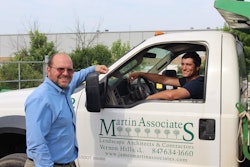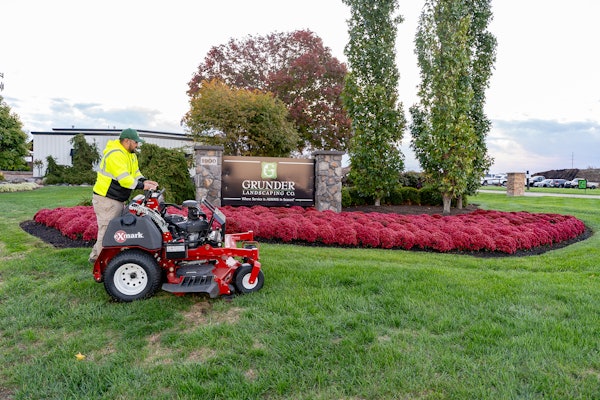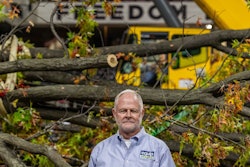 The Plant Concierge made the decision to become an exclusively organic provider in spring of 2016.
The Plant Concierge made the decision to become an exclusively organic provider in spring of 2016.Photo: LandOpt
When Thomas Fancher made the decision to shift his Texas-based landscape contracting business, The Plant Concierge, to an exclusively organic provider in spring of 2016, he did so to ensure all the properties the business serviced were safe for the customers and their children and pets. Fancher also realized there were only a few companies in Dallas offering full- or mostly-organic programs. Although he knew the decision was the right one for the environment and for his customers, it was not easy.
“When we decided to go all-organic, we didn’t give our clients a choice,” he says. “We only lost a few.”
A year-long trial period at six residential properties revealed that synthetic pre-emergents worked more effectively than their biological counterparts for new installs and shady areas. After the first full year, Fancher and his team realized the customers’ tolerance for weeds was lower than what they had disclosed in initial conversations. After additional time spent observing the test sites and gauging plant tolerance levels in different conditions, Fancher decided to back off advertising a 100 percent organic program and instead embraced a more sustainable, environmentally-conscious stance. Still, he shares, the results of implementing more organics have been striking.
“Our properties have never looked better, even in the midst of a drought and a severe water restriction,” he said.
Like Fancher, Fred Peratt, owner of Environmental Enhancements in Sterling, Virginia, believes once customers become more aware of the benefits of organics, they will be quick to sign up for natural solutions. Still, he understands the initial hesitation.
“Clients are used to synthetic programs,” he says. “They don’t want to change. But if you want to be a differentiator in the market, organics are the way to go.”
If you’re considering moving toward an organic program, here are three things to keep in mind.
Preparation
When switching from an all-synthetic program to a more environmentally friendly one, Fancher recommends starting small, as he did, with a residential test market. During the initial trial phase, he says, data collection is critical, admitting, “I wish we would have taken more pictures than we did.” Once data is collected, it can be analyzed to determine what worked and what didn’t. Fancher cautions against moving too quickly toward implementation in the commercial realm, instead advising that businesses first establish credibility with HOAs.
Education
Fancher knew the move to organics would mean plenty of time spent educating his existing and prospective customers on the benefits of the switch.
“We started engaging with our customers a year ahead of time,” he states. “Their main concerns were weeds and price, both of which we addressed through targeted education.”
Peratt stresses it’s also important for businesses to do their homework before committing to an organics program.
“Believe it or not, not all states are on board yet with organics,” he says. “So, always check state laws for how to get the relevant permissions to use biologicals versus synthetics.”
Return on investment
Peratt echoes Fancher’s call to education and stresses the critical importance of an appropriate transition period. He also encourages landscape contractors considering adding organics to their offerings not to be deterred by the price.
“It’s a small investment for a big return,” said Peratt. He stresses that while customers may balk in the short term when they don’t see the results they expect, they will be sold once they see how their plant installs fare over the long term. He says the switch benefits the bottom line, too. Fancher seconds this, adding, “Because there are no hazardous materials, our guys will fertilize while they’re on a job rather than us having to send out a separate crew. This saves us time and resources.”
The market
Wells Rawls of Horticultural Alliance recommends letting the customer decide whether to shift to biologicals.
 Pictured are James Quinn (left), owner of Horticultural Alliance, and Wells Rawls (right).
Pictured are James Quinn (left), owner of Horticultural Alliance, and Wells Rawls (right).Photo: LandOpt
“Offer both services alongside each other, and let the market determine how deep you go with organics,” he says. “Sell the benefits of probiotics and the importance of good bacteria to plant health.”
Rawls believes the industry is not sufficiently tapping into the probiotics trend, which could be a game changer in converting resistant customers from synthetics to organics to treat their plant installs.
“In my years on the front lines, I’ve seen an expectation and willingness of customers to pay a little more for an organic program,” he said. “That’s especially true if it’s marketing as ‘Safe for kids and pets.’ There definitely is a demand for that service.”
Today, The Plant Concierge strives to be as close to fully organic as possible, but Fancher recognizes some circumstances require minimal synthetic intervention. The business does not advertise synthetic programs, but they are still incorporated when conditions, such as new installs on turf, require pre-emergents to suppress weeds until the grass takes root and naturally chokes them out. Fancher maintains the move to incorporate more organics in his business’ menu of solutions was the right one.
“Organics are better for our bodies and for our plants,” he says. “Plants survive and thrive longer on a steady diet of organic materials.”
And the customers he lost?
“They were my lowest-performing accounts, so it all worked out for the best.”
EDITOR’S NOTE: This article was written by Lisa Perdue, manager of professional development with LandOpt. Lisa ensures that solid processes are in place for all phases of new product development and implementation related to the education, training and professional growth of LandOpt stakeholders.










